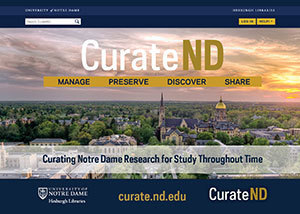The University of Notre Dame and the Hesburgh Libraries announce the launch of CurateND, a multifaceted research repository and portal designed to manage and preserve Notre Dame research and associated data so that it can be globally discovered, accessed and shared. CurateND will help to illuminate the University’s research mission, elevate the work of faculty and students and further Notre Dame’s impact around the world.
In keeping with current trends for research libraries, CurateND was developed by the Hesburgh Libraries Digital Initiatives and Scholarship Program led by Rick Johnson, program co-director, in partnership with individuals and departments from across the University. While key features are clustered around four main pillars — manage, preserve, discover, share — the needs vary significantly among disciplines and even individual researchers. “The development of a preservation and research tool that meets the diverse and changing needs of faculty and students has truly been a team effort thanks to interdisciplinary collaboration and input from dozens of early adopters across campus,” said Johnson.
Aspects of CurateND’s infrastructure are also the result of cross-institutional collaboration through the Hydra Partnership, a consortium of research institutions committed to developing secure, state-of-the-art repository solutions. Johnson said, “We are proud to be among the impressive list of Hydra Partners who are all staunchly committed to advancing research support through sustainable open source repositories.”
CurateND offers several features that enable researchers to: manage self-deposits, create unique profiles, support group ownership of works, assign user delegates, fulfill data management and sharing mandates, upload multiple data formats, build data collections, link to unlimited associated works, create DOIs (digital object identifiers), set permissions and embargo periods, customize metadata records and optimize global discovery and access. CurateND will be an evolving resource, based on user needs and feedback. To this end, future enhancements include dashboard features such as usage statistics and citation tracking.
Integrated repository solutions have become increasingly important in the digital landscape. Today’s researchers are often faced with public and private funding mandates that require research results to be preserved and made available to the public, industry and related communities. In addition, technology cultivates massive amounts of data, growing numbers of formats, and demand for access to all associated works. Research libraries are emerging as valuable partners in helping their institutions manage the full life cycle of data and research in this rapidly changing domain.
“We articulate our enduring mission as ‘connecting people to knowledge, and preserving that knowledge for study throughout time.’ The four pillars of CurateND — manage, preserve, discover, share — have always been integral to fulfilling this core mission, even as libraries evolve with the changing landscape. CurateND is what this looks like in a digital age,” noted Diane Walker, Edward H. Arnold University Librarian for the Hesburgh Libraries.
CurateND’s benefits surface at the faculty, college and University levels. Physics professor Michael Hildreth said, “Data preservation, discoverability and access are major issues for all of science moving forward. Almost every area of science is moving into a regime where there is big data to be analyzed, understood and archived. Our digital librarians have the expertise in data structures and cataloging to maximize the data sharing and archiving of large digital collections for future research.”
“Not only does CurateND archive and preserve scholarly works, it also accepts a wide range of formats which showcase the related raw data and materials that support those research efforts. It’s much more than a storage repository — it’s a robust research portal that can be easily accessed and that promotes learning and collaboration,” said Peter Kilpatrick, the Matthew McCloskey Dean of the College of Engineering.
“Research in the arts, social sciences and digital humanities often requires evidence of data management planning, preservation and sharing,” said John McGreevy, I.A. O’Shaughnessy Dean of the College of Arts and Letters. “Many of our researchers in the college are using data sets and archival materials that can best be preserved for other scholars at CurateND. And we imagine that, over the span of an academic career, CurateND may become a place where our scholars place drafts, completed projects and other materials so as to allow the wider world better access to their work.”
“A robust framework to ensure that our research can be organized, preserved, accessed and shared is critical in the 21st century,” said Robert J. Bernhard, vice president for research. “Thanks to the leadership of the Hesburgh Libraries and the contributions of many, CurateND is a local capability that we hope will be our first step to a new paradigm where research results are readily retrievable and useable for scholars around the world.”
Notre Dame users can create an account at curate.nd.edu and access a suite of support services in person or online. Help tools such as FAQs are available through the website, and custom support and solutions are available in consultation with experts from the Hesburgh Libraries and the Center for Digital Scholarship. Visit curate.nd.edu or contact Rick Johnson at rick.johnson@nd.edu for more information about creating a profile, starting a project, attending workshops and trainings or scheduling individual consultations.
Contact: Tara O’Leary, Hesburgh Libraries, 574-631-1856, toleary2@nd.edu
Originally published by at news.nd.edu on February 05, 2015.
